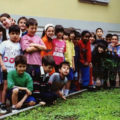The weekend of October 9-10, all of downtown Lecco was the stage for the Corteo Manzoniano, a “travelling” representation of that famous piece of local literature, Manzoni’s I Promessi Sposi (The Betrothed), most of whose action takes place in and around Lecco and Milan. Groups of actors in gorgeous costumes paraded among five or six fixed stages, or acted out scenes on small travelling platforms, or on horseback.
Tradimento! (Betrayal)shot Oct 10, 2004, 1:17 mins, 3.7 MB |
||
|
The betrothed couple of the title, Renzo and Lucia, attempt to trick the priest Don Abbondio into marrying them. Don Abbondio is understandably reluctant, since Don Rodrigo (a different use of the title “Don” !), the local Spanish overlord, has sent a couple of thugs (bravi) to inform him that: “Questo matrimonio non s’ha da fare.” – “This marriage should not take place.” (Don Rodrigo wants Lucia for himself.) Don Abbondio discovers the trick in time; much yelling and confusion ensue. |
||
The Kidnapping of Lucia22 secs, 1.8 MB |
||
|
You can’t see it in this shot, but Lucia is being grabbed and bundled into the carriage, screaming. The horses didn’t like the noise and started rearing, which was scary, but after watching the scene re-enacted, I suspected that they were very well trained to look as if they were freaking out, but were actually under the control of their driver. |
||
Procession31 secs, 2.5 MB |
||
|
I don’t know who all these characters are, but I liked the chanting and the pretty horses. Until my cellphone rang… |
||
La Peste1:55 mins, 5.6 MB |
||
|
The plague (peste) ravages Milan. Bodies are carried away by the cartload. A grieving mother says farewell to her young daughter, placing her body tenderly on the cart, and tells the corpse-collectors: “Come back this evening to take me, and not only.” |
||
Parade1:59 mins , 5.8 MB |
||
| The first character you see here (with the leather banding on his shirt) is probablyl’Innominato (the Unnamed), the bad guy who turns good. The band and the music are totally out of period, but at least they’re Lecchesi – the theater company is actually from Bergamo. | ||
The Grim Sweepers44 secs, 2.2 MB |
||
|
These stilt-walkers closed the parade. Black and purple are the colors of mourning in Italy. I have no idea why they had brooms, except the purely practical purpose of balancing the scythes on the other end. |
||





